牛津版必修1《Module1 Unit2 word study》学案
牛津高中英语模块一Unit-2教案
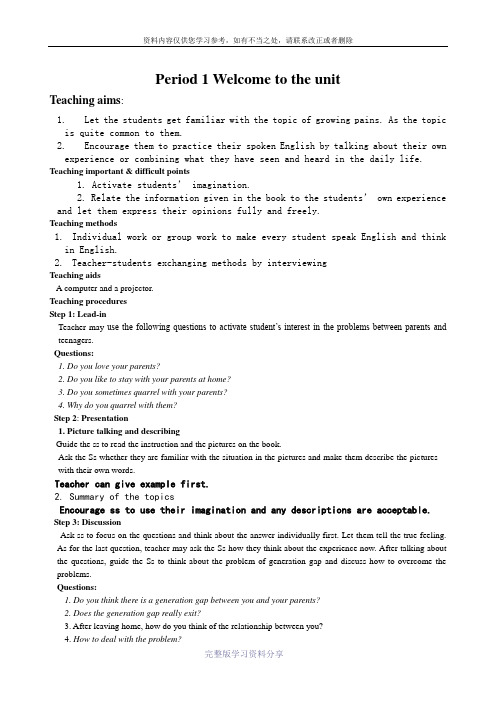
Period 1 Welcome to the unitTeaching aims:1.Let the students get familiar with the topic of growing pains. As the topicis quite common to them.2.Encourage them to practice their spoken English by talking about their ownexperience or combining what they have seen and heard in the daily life. Teaching important & difficult points1. Activate students’ imagination.2. Relate the information given in the book to the students’ own experience and let them express their opinions fully and freely.Teaching methods1.Individual work or group work to make every student speak English and thinkin English.2.Teacher-students exchanging methods by interviewingTeaching aidsA computer and a projector.Teaching proceduresStep 1: Lead-inTeacher may use the following questions to activate student’s interest in the problems between parents and teenagers.Questions:1. Do you love your parents?2. Do you like to stay with your parents at home?3. Do you sometimes quarrel with your parents?4. Why do you quarrel with them?Step 2: Presentation1. Picture talking and describingGuide the ss to read the instruction and the pictures on the book.Ask the Ss whether they are familiar with the situation in the pictures and make them describe the pictures with their own words.Teacher can give example first.2. Summary of the topicsEncourage ss to use their imagination and any descriptions are acceptable. Step 3: DiscussionAsk ss to focus on the questions and think about the answer individually first. Let them tell the true feeling. As for the last question, teacher may ask the Ss how they think about the experience now. After talking about the questions, guide the Ss to think about the problem of generation gap and discuss how to overcome the problems.Questions:1. Do you think there is a generation gap between you and your parents?2. Does the generation gap really exit?3. After leaving home, how do you think of the relationship between you?4. How to deal with the problem?5. When you have a problem with them and want to talk to someone, who do you choose to talk to?Let the ss conduct a feedback activity.Step 4: SummaryMake a conclusion: Growing pains can be very painful if we do nothing to understand others and make others understand us. Try to let your parents know how you feel and care your parents’ feeling, too. In this class we have talked about the difficulty in growing up. We have a warm discussion about the pictures and the problems happening to children and their parents. From this class we know out parents’ love is rue and selfless. Now I give you your homework—write a few words to your parents from you deep heart, which can express your love to your parents.Step 5: HomeworkAsk students to write one of their experiences, enjoyable or painful, on their exercise books.Teaching Post-description:__________________________________________________________________________________________ __________________________________________________________________________________________ __________________________________________________________________________________________ __________________________________________________________________________________________ __________________________________________________________________________________________ ________________________________________________________________________________________________Periods 2-5 ReadingHome AloneTeaching aims:1.The Reading strategy of this part teaches Ss some characteristics of a play and the basic skills of how to reada play.2. Enable Ss to master some important language points.3. Make sure the Ss can deal with the problems that happen in their family correctly and peacefully. Teaching important and difficult points:1.Help the Ss understand the text better.2.How to improve Ss reading ability.Teaching methods:1.Ask Ss to do fast-reading to get general idea of the play.2.Ask them to do careful-reading to understand detailed information.3.Pair or group work to participate in class.Teaching Aids:1. A tape recorder.2. A multimedia.Teaching procedures:Step 1: Lead-inT: first please look at these pictures, what are the feelings of kids who are left home alone?Well, “Growing Pains” was a very popular TV show during the 1960s & 1970s. The teacher has to make sure Ss know about it by introducing parts of the famous TV show.1. Have you ever had this kind of experience when your parents had to go away and leave you alone or with a pet?2. If no, can you imagine what might happen if you were left alone?3. Could you handle all the responsibility and keep everything clean and safe?Step 2: Fast-reading1.Ask Ss to read the play quickly and find answers to Part A.2.Check them together.Step 3: Careful reading1.Ask Ss to read the play a second time and tell them to pay attention that the play has two acts, each withdifferent themes, encouraging them to read it out loud.2.Finish Part C1-C23.Check answers together.Step 4: Reading strategy1.Ask Ss to discuss, read the reading strategy on page 23 and know how to read a play.2.Practise reading the play.3.To find more sentences said by each character of the play4.Then finish Part D1-D2-EStep 5: Language pointsAfter knowing the general idea of the text, then deal with some language points to make sure Ss can understand the text in details.1.be angry with sb. anger2.happen to do sth. sth happen to sb.3.be on vacation/ holiday4.than expected5.can’t wait to do sth.6.surprise –surprised--surprisingto one’s surprise= to the surprise of sb.follow—following7.be surpposed to / be expected/ required to8.bend—bent—bent9.be to do..10.be gone /be lost/ missing11.do with (what )deal with(How)12.explain—explanationexplain sth. to sb. explain to sb. sth.explain to sb. that….13.in a mess14.With + O. + O.C. (Prep. Adv. Adj. v-ing, P.P/n. to do )15.leave16.in charge of17.reason for/why18.go unpunished19.we thought…..20.teenager /teen in one’s teensteenage adj.~ problems/ children21.fault/mistake22.go out23.have sth. Done24.scene25.no more not any moreno longer not any longer26.deserve27.be hard on28.now that29.be rude to30.feel like + n./ pron. /v-ing/ that…31.we didn’t think…否定迁移32.should have doneStep 6: PracticeI. 单词拼写:根据句意及汉语提示或首字母,写出各句中所缺单词的正确形式。
【知识学习】高一英语牛津英语模块1 Unit2学案
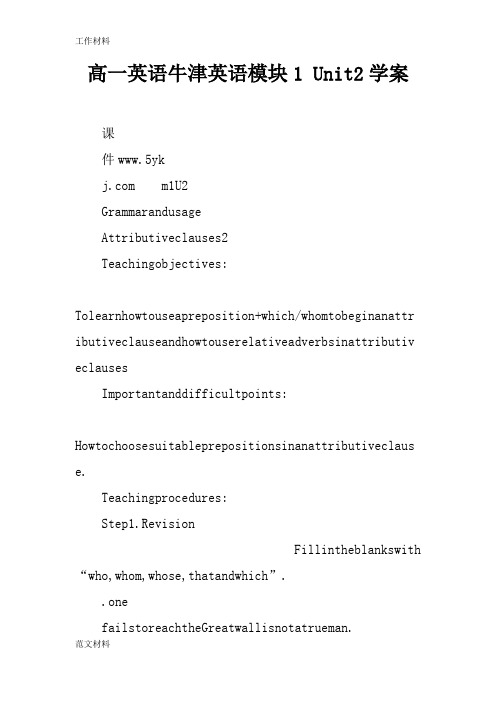
高一英语牛津英语模块1 Unit2学案课件www.5yk m1U2GrammarandusageAttributiveclauses2Teachingobjectives:Tolearnhowtouseapreposition+which/whomtobeginanattr ibutiveclauseandhowtouserelativeadverbsinattributiv eclausesImportantanddifficultpoints:Howtochoosesuitableprepositionsinanattributiveclaus e.Teachingprocedures:Step1.RevisionFillintheblankswith “who,whom,whose,thatandwhich”..onefailstoreachtheGreatwallisnotatrueman.2.Isthistheshopsellschildren’sclothing?3.Thisistheboyfootballwaslost.4.Thatyouborrowedfrommewasn’tarealdiamondnecklace.5.Heisnolongertheshyboyhewas.Step2.GrammarandUsagePreposition+whichandpreposition+whomReadpoint1andmakesurestudentsknowwhentouseattributi veclausewithpreposition..Thepenisbroken,soI’llhavetobuyanewone.Iwritemyhomeworkwithiteveryday2.ThepenwithwhichIwritemyhomeworkeverydayisbroken,soI ’llhavetobuyanewone.3.Themanisovereighty.Iboughttheoldpictureforhim.4.ThemanforwhomIboughttheoldpictureisovereighty.5.Readpoint2,getthemtowritethesentencesinformalEnglish.6.ThemathsteacheristhepersonfromwhomIgotanAplus.7.ArtisthesubjectaboutwhichIknowlittle.8.Theyrefusedtotakeonanyone___eyesightwaspoor.9.Thegentleman______youtoldmeaboutyesterdayprovedtobe thief.0.whoisthestudentwaslateforschool?Readpoint3and4,andaskthemtowritethesentencesindiffe rentways..DadisapersontowhomIcaneasilytalk.2.Dadisapersonwhom/who/thatIcaneasilytalkto.3.DadisapersonIcaneasilytalkto.Appendix)“介词+关系代词“可以引导限制性定语从句,也可以引导非限制性定语从句。
高一牛津模块1Unit1教案(译林牛津版高一英语必修一教案教学设计)
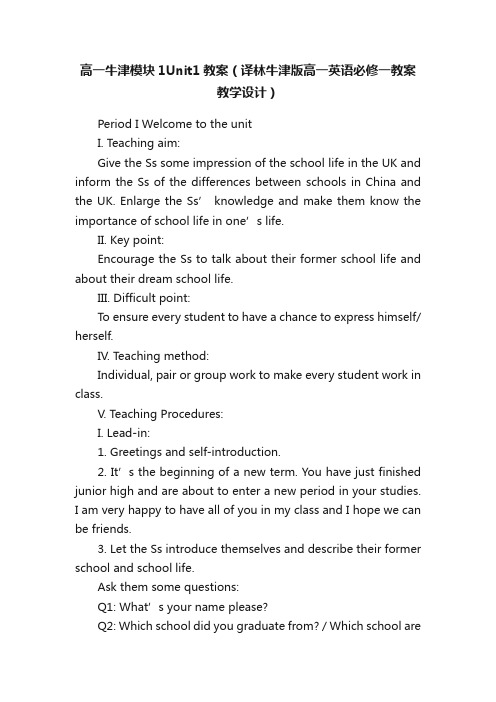
高一牛津模块1Unit1教案(译林牛津版高一英语必修一教案教学设计)Period I Welcome to the unitI. Teaching aim:Give the Ss some impression of the school life in the UK and inform the Ss of the differences between schools in China and the UK. Enlarge the Ss’ knowledge and make them know the importance of school life in one’s life.II. Key point:Encourage the Ss to talk about their former school life and about their dream school life.III. Difficult point:To ensure every student to have a chance to express himself/ herself.IV. Teaching method:Individual, pair or group work to make every student work in class.V. Teaching Procedures:I. Lead-in:1. Greetings and self-introduction.2. It’s the beginning of a new ter m. You have just finished junior high and are about to enter a new period in your studies.I am very happy to have all of you in my class and I hope we can be friends.3. Let the Ss introduce themselves and describe their former school and school life.Ask them some questions:Q1: What’s your name please?Q2: Which school did you graduate from? / Which school areyou from?Q3: Do you have any hobbies?Q4: How do you often spend your spare time?4. Introduce what studying at senior high will be like and the differences between junior high and senior high.II. Brainstorming:1. Ask the Ss to read the instructions and focus on the four pictures.Today we are going to look at schools in the UK and try and work out if they are the same or different from schools in China.2. Encourage the Ss to talk about each picture with the following diagram to help them.Pic In the UK In China1 Huge campus and low-rise buildings2 Lockers for every student3 Fewer students in each class4 At ease with our teacherIII. Further Discussion:1. Organize students into pairs or small groups.2. Discuss the three questions below the pictures in groups.3. Get small groups to report their conclusions back to the whole class.4. Conduct a feedback activity.IV. Summary and Homework:1. Today we have a good beginning: We have introduced ourselves to each other, and know about the differences between the lives of Chinese and British high school students. We also givea brief description of our dream school life.2. Find out more differences between the lives of Chinese and British high school students, say more about your dreamschool life.3. Make a plan of their studies in the coming years and a list of goals that they want to achieve in the three years.Period II ReadingSchool life in the UKI. Teaching Aims:Train the Ss’ reading abilities.Learn some useful words and expressions.Learn more about school life in the UK and the differences between school life in the UK and in China.II. Key Points:1. Help the Ss to understand the passage better.2. Learn and master some important words and phrases in this period.III. Difficult Points:1. How to help the Ss improve their reading ability and understand the passage better.2. How to master the important language points in this passage.IV. Teaching Methods:1. Fast reading to get the general idea of the text.2. Careful reading to understand the passage better.3. Discussion to help the Ss understand what they’ve learned better.4. Explanation to help the Ss master some language points.V. Teaching Procedures:I. Lead-in:1. Greetings.2. Check the homework.3. Differences between high schools in our country and theUK and opinions on many factors and reasons for such phenomena.II. Presentation:Reading strategies: skimming and scanning.Skimming: We skim a text when we want to get a general idea of what it is about. We look at the titles and headings, the first and last sentences of paragraphs and the first and last paragraphs as well as pictures and charts to guess what the text is about.Scanning: When we want to find certain information in a text quickly, we scan the text for key words and phrase, dates, numbers, etc. We do not need to read the whole text word by word.II. Skimming:1. Ask the Ss to go through the passage as quickly as possible and try to find answers to the three questions in Part A.Answers: 1. For one year. 2. Mr Heywood. 3. A small table.III. Careful reading:1. Listening while dealing with C2.Answers: C2: 1.T 2.T 3.T 4.F 5.F 6.T 7.F2. Read the article carefully and answer the questions in C1.Answers: C1: 1. School begins at around 9 a.m. and ends at about 3:30 p.m.2. 29.3. Because all the homework was in English.4. She had an extra French class.5. Lots of desserts.6. Manchester.IV. Language Points:1.(L1) Going to a British high school for one year was a veryenjoyable and exciting experience for me.① Gerund as subject:Working in these conditions is no easy job.Meeting you has been a great pleasure.* It’s no use/good sending him over. It’s too la te already.It’s a waste of time arguing about it.② exciting / excitede.g.: The children were excited at the very thought of the journey.It’s an exciting experience to swim in the sea.All the students were all excited at the exciting news.*vt. excite n. excitement adv. excitedly③ experience※ 10.(L47) I was very lucky to experience this different way of life.experience: n. & verb.[u]n. Do you have any previous experience of this type of work?My lack of practical experience was a disadvantage.* learn from experience 从经验中学得/ in one’s experience 据……的经验看[c]n. an enjoyable / unforgettable / unusual experienceIt was her first experience of living alone.verb.:e.g.: Everyone experiences these problems at some time in their lives.(经历,遭受)I experienced a moment of panic as I boarded the plane.(感受,体会)*adj.: experiencedan experienced teacher/doctorHe is experienced in looking after animals.2.(L2) I was very happy with the school hours in Britain because school starts around 9 a.m. and ends about 3 p.m.be happy with/ about : be satisfied with 对…...满意e.g. : Are you happy with this arrangement?She was happy enough with her performance.* 1. We are happy to announce the engagement of our daughter.2. The story has a happy ending.3. He will be more than happy to come with us.4. by a happy coincidence, we arrived at exactly the same time.5. That wasn’t the happiest choice of words.3.(L6) On the first day, all students went to attend assembly.* attend:△ be present at an event 出席,参加e.g.: The meeting was attended by 90% of shareholders.~ a meeting / a wedding / a funeral / assembly△ go regularly to a place 定期去,经常去e.g.: Our children attend the same school.How many people attend church every Sunday?△ pay attention to what sb. is saying or to what you’re doing 注意,专心e.g.: She hasn’t been attending during the lesson.*attend to: deal with 处理,对付 take care of 照料,关心e.g.: I have some urgent business to attend to.A particular nurse attended to him / his needs while he was in hospital.Are you being attended to , Sir? 先生,有人接待您吗?n. attendancec.f. join / join in / take part in(1) Tomorrow I will go to ________ an important meeting.(2) Would you please _______ our walking.(3) He likes _______ all kinds of outdoor activities actively.(4) Every weekend the old woman would go ________ church.4.(L9) He also told us that the best way to earn respect from the school was to work hard and achieve high grades.(1) way: 方法 way to do sth. / way of doing sth.e.g. There are a lot of ways to make money.Soon I got used to the American ways of doing things.* in a way / in one’s own way / in no way / in the way / on the way/ on one’s way/ in this waye.g.: Your answer is in a way correct.He likes to attend to his affairs in his own way.He is no help at all; actually he is in the way.In no way can you tell him the truth.Work hard! We are on the way to success.On the way to the school, I found a man lying on the road.A car was in the way. We couldn’t get through.You can do it in your own way.(2) earn: vt. ①get money for work that you do 挣得;赚得e.g.: He earns about £10 000 a year.She earned a living as a part-time secretary. (=make a living) earn money / a fortune/②get something that you deserve, usually because of sth good you have done or because of the good qualities you have. 获得;赢得e.g.: He earned a reputation as an expert on tax law.As a teacher, she had earned the respect and admiration of her students.He has worked so hard that he’s earned a holiday.* earn one’s keep:e.g.: He worked hard but can’t earn his keep.*n. earnings(3) respect: n. ① a feeling of admiration for sb/sth because of their good qualities or achievements 尊重;尊敬;敬意 ~ for sb / sthe.g.: I have the greatest respect for your brother.A deep mutual respect and understanding developed between them.self-respect② polite behaviour towards or care for sb/sth that you think is important 重视;尊重e.g.: He is so conceited that he show a lack of respect for authority.He has no respect for her wife’s feelings.* in this respect 在这方面in respect of / with respect to (=concerning/ regarding / respecting) 关于;就……而言With respect, sir, I can’t agree. 恕我直言vt. have a very good opinion of sb/ sth: admire sb/sth 尊敬;尊重;仰慕 ~ sb/sth for sthe.g.: I respect Jack’s opinion on most subjects.She had always been honest with me, and I respect her for that.* a much loved and highly respected teacher 备受爱戴和尊敬的老师adj. respectful 表示敬意的;尊敬的respectable 值得尊敬的;体面的(4) achieve: vt.e.g.: He had finally achieved great success in the experiment.No one can achieve anything without effort. ( succeed in reaching a particular goal or standard)Their background gives them little chance of achieving at school.(be successful)adj. achievable 可以达到的 n. achievement 成绩;成就;功绩5.(L16) This is about the average size for British schools.* average: adj.an average rate / cost / earnings 平均的above / below average intelligence 正常的;一般的n.The average of 4,5 and 9 is 6. 平均数Parents spend an average of $220 a year on toys for their children.(well) above / below /up to (the) average 平均线;平均水平on average 平均e.g.: After he became famous, he receives 50 letters a day on average.6.(L20) I found the homework was not as heavy as what I used to get in my old school, but it was a bit difficult for me at first because all the homework was in English.(1) as … as: → as + adj./ adv. as as + adj.+a/an + n. + as as+many/much…+n. +ase.g.: He doesn’t speak as fluently as I do.Our neighbour has as big a house as ours.We’ve produced twice as much cotton as we did ten years ago.* as long as / so long as / as well as / as far as / so far as / as good as / as early as / as … as possible / as … as sb. can(2) what+noun-clause:e.g.: What he does doesn’t agree with what he says.No one told me what was happening on the night of last Sunday.(3) used to:e.g.: There used to be a river in front of our school gate, usen’t / usedn’t / didn’t there?→Used there to be …? Or: Did there use to be …?I used to smoke, but I gave up several years ago.c.f.: be used to do 被用来 be / get used to sth./doing sth. 习惯于;适应e.g.: Wood can be used to make tables.He isn’t used to the life / living in the big city.Don’t worry--- you’ll soon get used to his sense of humour.(4) a bit:△ = a little I am a bit / a little tired.Work a bit/a little harder and you’l l earn higher grades.△c.f.: a little This will give us a bit of / a little time.△ not a little : very much / not a bit: not at alle.g.: He doesn’t work hard usually, so each time he is not a little worried about the exams.He has been well prepared for the exam, so he is not a bit worried.* bit by bit逐渐地 / a bit of 稍微,颇有几分/ every bit完全 / do one’s bit尽一己之力7.(L26) My English improved as I used English every day and spent an hour each day reading English books in the library.(1) as: conj.e.g.: As he grew older, he lost interest in drawing.Leave the papers as they are.As she has been ill, perhaps she will need some help.Young as he is, he knows a lot.(2) spend: vt. (spent, spent)* spend sth. on sth. spend sth. (in) doing sth.e.g.: He spent ¥1000 on a new suit / updating his computer.She spent too much effort on things that doesn’t matter.c.f.: spend take pay cost worthe.g.: How much does the book _______? How much is the book __________?It ______ her twenty minutes to go to school on foot.While studying in London, she _______ a lot of money on books.He only _______ the owner half the price for the dictionary.8.(L28) I joined the computer club at lunch time, so I could e-mail my family and friends back home for free.free: adj. vt. & adv.adj.: I have no ambitious other than to have a happy life and be free.(be free to do…)“Can I use the phone?” “Please, feel free.”He walked out of jail a free man.We are offering a free gift so long as you come to our store.(for free)Ensure there is a free flow of air around the machine.He held out his free hand and I caught it.If you are free for lunch, I will take you out.This food is absolutely free from artificial colour and flavourings.free from…不受……影响的,没有……的free of…. 无……的,摆脱了……的(free of charge)set free 释放IDM: free and easy 随变,无拘束 get / have a free hand 可以全权处理,有自主权There is no such thing as a free lunch.没有免费的误餐。
高一英语牛津英语模块1?Unit2学案
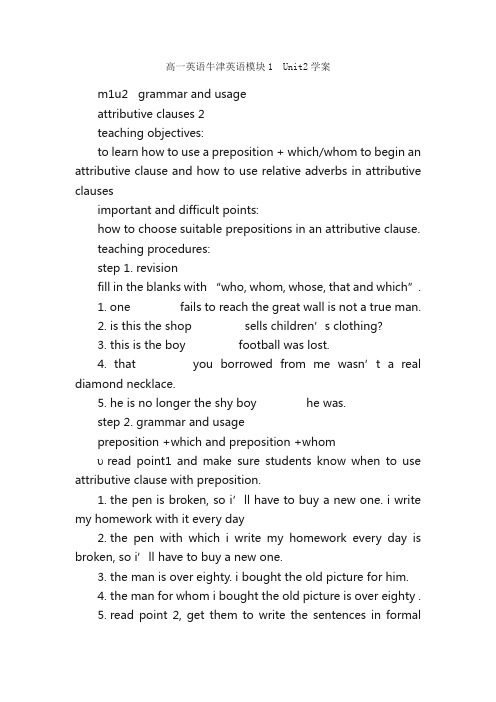
高一英语牛津英语模块1 Unit2学案m1u2 grammar and usageattributive clauses 2teaching objectives:to learn how to use a preposition + which/whom to begin an attributive clause and how to use relative adverbs in attributive clausesimportant and difficult points:how to choose suitable prepositions in an attributive clause.teaching procedures:step 1. revisionfill in the blanks with “who, whom, whose, that and which”.1. one fails to reach the great wall is not a true man.2. is this the shop sells children’s clothing?3. this is the boy football was lost.4. that you borrowed from me wasn’t a real diamond necklace.5. he is no longer the shy boy he was.step 2. grammar and usagepreposition +which and preposition +whomread point1 and make sure students know when to use attributive clause with preposition.1. the pen is broken, so i’ll have to buy a new one. i write my homework with it every day2. the pen with which i write my homework every day is broken, so i’ll have to buy a new one.3. the man is over eighty. i bought the old picture for him.4. the man for whom i bought the old picture is over eighty .5. read point 2, get them to write the sentences in formalenglish.6. the maths teacher is the person from whom i got an a plus.7. art is the subject about which i know little.8. they refused to take on anyone ___ eyesight was poor.9. the gentleman ______you told me about yesterday proved to be thief.10. who is the student was late for school ?υ read point 3 and 4,and ask them to write the sentences in different ways.1. dad is a person to whom i can easily talk.2. dad is a person whom/who/that i can easily talk to.3. dad is a person i can easily talk to.υ appendix1) “介词+关系代词“可以引导限制性定语从句,也可以引导非限制性定语从句。
(完整word版)牛津版高一英语必修1全套教案
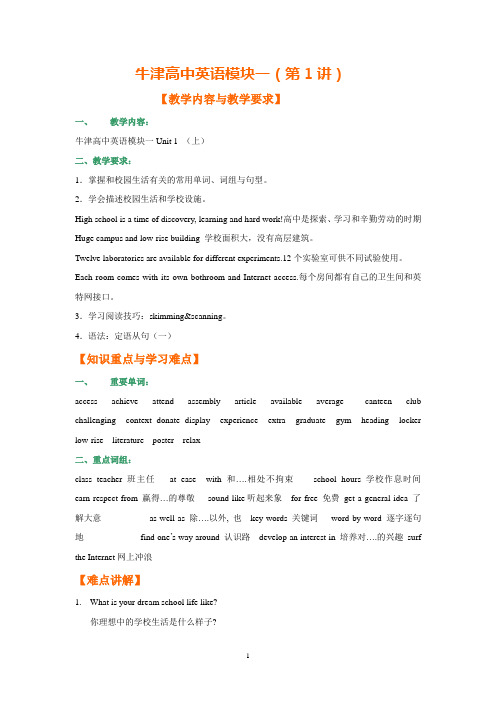
牛津高中英语模块一(第1讲)【教学内容与教学要求】一、教学内容:牛津高中英语模块一Unit 1 (上)二、教学要求:1.掌握和校园生活有关的常用单词、词组与句型。
2.学会描述校园生活和学校设施。
High school is a time of discovery, learning and hard work!高中是探索、学习和辛勤劳动的时期Huge campus and low-rise building 学校面积大,没有高层建筑。
Twelve laboratories are available for different experiments.12个实验室可供不同试验使用。
Each room comes with its own bothroom and Internet access.每个房间都有自己的卫生间和英特网接口。
3.学习阅读技巧:skimming&scanning。
4.语法:定语从句(一)【知识重点与学习难点】一、重要单词:access achieve attend assembly article available average canteen club challenging context donate display experience extra graduate gym heading locker low-rise literature poster relax二、重点词组:class teacher 班主任at ease with 和….相处不拘束school hours学校作息时间earn respect from 赢得…的尊敬sound like听起来象for free 免费get a general idea 了解大意as well as 除….以外, 也key words 关键词word by word 逐字逐句地find one’s way around 认识路develop an interest in 培养对….的兴趣surf the Internet网上冲浪【难点讲解】1.What is your dream school life like?你理想中的学校生活是什么样子?这里dream表示心目中最理想的. 如dream team (梦之队)。
高中英语模块一unit2完整导学案牛津版必修1
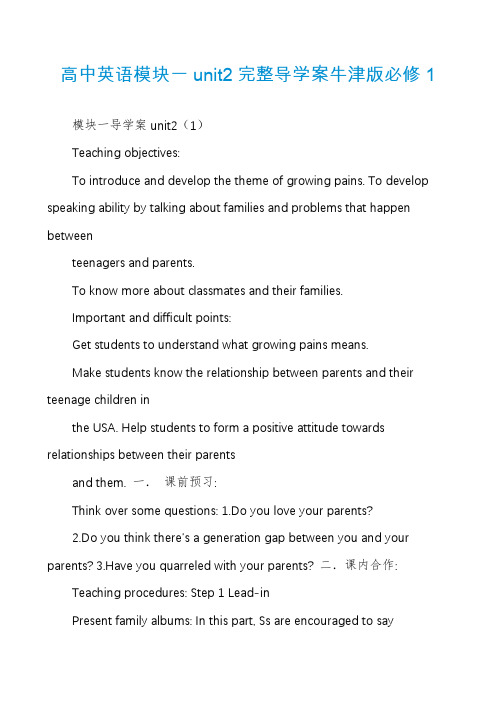
高中英语模块一unit2完整导学案牛津版必修1模块一导学案unit2(1)Teaching objectives:To introduce and develop the theme of growing pains. To develop speaking ability by talking about families and problems that happen betweenteenagers and parents.To know more about classmates and their families.Important and difficult points:Get students to understand what growing pains means.Make students know the relationship between parents and their teenage children inthe USA. Help students to form a positive attitude towards relationships between their parentsand them. 一.课前预习:Think over some questions: 1.Do you love your parents?2.Do you think there’s a generation gap between you and your parents?3.Have you quarreled with your parents? 二.课内合作: Teaching procedures: Step 1 Lead-inPresent family albums: In this part, Ss are encouraged to saysomething about their families by showing the class pictures with their parents. 1.Who may have growing pains? 2.What are Growing pains?3.When do they probably have growing pains?4.How do you solve this problem?Growing pains aren't a disease. You probably won't have to go to the doctor for them. But they can hurt. Usually they happen when kids are between the ages of 3 and 5 or 8 and 12. Growing pains stop when kids stop growing. By the teen years, most kids don't get growing pains anymore.Growing pains also mean the troubles and difficulties that teenagers meet when they grow up.Step 2 Brainstorming1.Do you love your parents?2.Do you always show respect to your parents?3.Have you ever quarreled with your parents?4.What is your quarrel about? Step 3 Picture discussionAsk Ss to look at the pictures and discuss each picture in groups of four. Picture 1What does the boy do?What is the mother doing? How is she probably feeling? What feelings may the boy have? Picture 2What happens to the girl with a bag?What did her parents ask her to do?Can you guess what might have happened to her? What will she do? Picture 3Why are the boys and girls around the pretty lady?What does the boy want to do? Is he allowed to do so? Why or why not? What feelings may the boy have? Picture 4What is the boy probably doing? Did the boy do well in his exams?How does his mother feel about the score? What feelings may the boy have? Step 4 Picture descriptionImagine the situations and try to describe each picture as fully as possible with their own words. Make sure that Ss have “when”, “where”, “who”, “what” in your descriptions.Invite some Ss to report back their descriptions. Sharing opinions (group work)In this part, Ss discuss the following questions in groups of four. Each group chooses two of the four questions. Have Ss to report their opinions in class. Step 5 Further DiscussionDiscuss the following questions in groups of four.What do you do when you have family arguments with your parents?Do you think there is a generation gap between you and your parents? If so, what is the best way to solve the problem?Homework1 Preview the Reading part.2 Describe an unpleasant experience with your friends/teachers.姜灶中学20XX年-20XX年度高一英语模块一导学案unit2(2)Teaching objectives:To develop students’ ability of reading a play To know about American family life and problems that happen between American teenagersand their parentsTo form a positive attitude towards solving problems between teenagers and parents Important and difficult points:Learn to analyze the emotions of each character from the instructions of the play.一.课前预习:1. 预习单词p22-23.2. 完成Reading A,C1,C2,D1 二.课内合作:Teaching procedures: Step 1 Lead-in:Get students to think about the following questions:1.Have you ever watched the famous American TV comedy “Growing Pains”?2.Could you list some of the members of the family? (Show them a photo and tell them the family members.)3.What do you think of the play?4.If you were left alone, can you imagine what might happen? Step 2 ReadingPlease go through the Reading strategy and tell me how to read a play. (make sure students know how to read a play.) Fast reading: Get students to read the play and finish Part A individually. Answers1.Eric,Daniel, Mom and Dad.2. The room was a mess./ There was trash all over the place.3. Spot was ill. Careful reading:Read the passage carefully, and decide which one are T and which one are F. 1.Mom and Dad were back from their holiday a week earlier. 2.Eric was happy when seeing his mother. 3. Parents left Daniel in charge.4.The boys spent the money seeing the vet for Spot.5.The room was very clean and tidy when their parents came back.6.Daniel didn’t have a chance to explain what had happened.7.Mom felt regretful for what they said to Daniel.8.Boys didn’t use u p the money from their parents. Word studyChoose the correct one:1.I just finished my vacation to Yunnan. A. work B. holiday2. The man explained to the people that the factory had been close.A. to give meaning of sth.B. to give a reason for sth. 3. When I went into the room, I found the room was in a mess. A. difficult state B. a dirty or untidy state 4. A teacher should trust his students.A. look afterB. believe that sb. is good 5. The woman was mad at the dog for eating her shoes. A. worried B. angry6. It is rude to run into other’s house without knocking at the door. A. not polite B. anxiousDetailed reading1.Please read Act One of the play carefully and fill in the form2. Please read Act Two carefully and fill in form:Step 3 Role-playDivide students into groups of five and one is the narrator and the others are the main characters. Role-play Act One and Act Two. Step 4 Discussion1.Suppose you were one of the children what would you do?2.How do you think good parents should treat their children?3.Do you think there is a generation gap between you and your family? How can you deal with it?Step 5 Homework:1 Write an end to the play.2 Role-play the dialogue in groups of five.姜灶中学20XX年-20XX年度高一英语模块一导学案unit2(3)Important and difficult points:Learn the usages of some words and phrases.1.vacation(Am. E) n.假期,休假(常用单数)不指假日或节日holiday(Br.E)n. 既可指假期,也可指节假日可说a holiday/ holidays leave n. 指雇员有理由而获准的假期,多指病假或事假the summer holidays= the summer vacation on holiday/ on vacation在度假go on holidays去度假take a holiday/ vacation休假ask for leave请假ask for sick leave请病假take a day off请一天假In order to win the game,he had to ask the director for half a month’s _____________. A.leave B.vacation C.holiday D.stay 2.expectthan expected省略they are ‘比预料中’ a)expect有时用在than或as 引导的从句中You arrived earlier than I had expected.“预料,期待,指望”,后接名,代,动词不定式或从句I expect that he will pass the exam. None of us expected it.We are expecting a telegram.Mother expects you to come back as soon as possible. expect 可译做“期待”,它侧重于人的心理状态,而不是动作wait(for) 等待,侧重指动作Why didn’t you come yesterday? We all expected you. I’ll wait for you at the entrance to the cinema. -Do you think the Rocket will beat the Bulls?-Yes. They have better players, so I ____________ them to win. A. hopeB.preferC.expectD.want3.The curtains are closed and the living room is dark when Mom and Dad enter. enter (vi.) (vt.) come or go in or into 进来之前请先敲门.You should knock the door before you enter. 小偷从后门进入了大楼.The thieves entered the building through the back door. I entered my own data into the computer. write information写下或输入Our teacher entered me for the English competition. make take part in帮某人报名参加The two old men entered into a long discussion. begin doing sth.开始某事4.can’t wait to do sth 迫不及待做某事=be anxious to do sth I can’t wait to see her again.be eager to do sth 渴望做某事desire to do sth 希望做某事look forward to doing sth 盼望做某事He is eager to succeed.We greatly desired to come to China.They are looking forward to hearing from you soon.5.She looks so young,but ___________,she is the mother of two children. A.to the surprise of me B.to the surprise C.for my surprise D.with her surpriseto one’s surprise=to the surprise of sb令某人惊讶的是。
Module1Unit1复习学案(译林牛津版高一英语必修二教案教学设计)
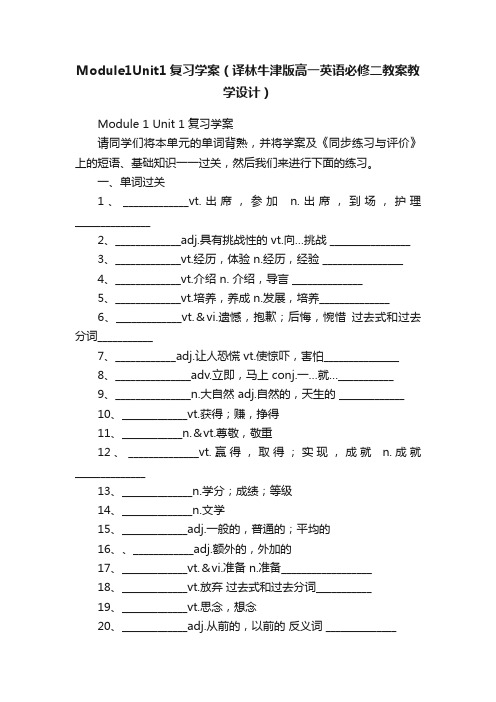
Module1Unit1复习学案(译林牛津版高一英语必修二教案教学设计)Module 1 Unit 1 复习学案请同学们将本单元的单词背熟,并将学案及《同步练习与评价》上的短语、基础知识一一过关,然后我们来进行下面的练习。
一、单词过关1、_____________vt.出席,参加n.出席,到场,护理_______________2、_____________adj.具有挑战性的 vt.向…挑战 ________________3、_____________vt.经历,体验 n.经历,经验 ________________4、_____________vt.介绍 n. 介绍,导言 ______________5、_____________vt.培养,养成 n.发展,培养______________6、_____________vt.&vi.遗憾,抱歉;后悔,惋惜过去式和过去分词___________7、____________adj.让人恐慌 vt.使惊吓,害怕_______________8、_______________adv.立即,马上 conj.一…就…___________9、_______________n.大自然 adj.自然的,天生的 _____________10、_____________vt.获得;赚,挣得11、____________n.&vt.尊敬,敬重12、______________vt.赢得,取得;实现,成就n.成就______________13、______________n.学分;成绩;等级14、______________n.文学15、_____________adj.一般的,普通的;平均的16、、____________adj.额外的,外加的17、_____________vt.&vi.准备 n.准备__________________18、_____________vt.放弃过去式和过去分词___________19、_____________vt.思念,想念20、_____________adj.从前的,以前的反义词 ______________21、_____________n.文化 adj. 文化的 _______________22、_____________vt.捐赠;赠予 n. 捐赠物________________23、_____________vt.陈列,展览24、_____________ vt.&vi.批准,通过;赞成25、_____________集会n. 26、_____________ 甜点n.27、_____________最近adv. 28、_____________ 远足n. 29、___ 善举n. 30、 ___演说n.31、 ___ 朝代n. 32、 ___通知,告知v.二、短语过关(一)介词填空1._________free 免费2 .pay attention_____ 注意3 .inform sb _______sth 通知某人某事4. know_______ 了解5. ______the first day 在第一天6.earn respect________ 赢得尊敬7. _______lunchtime 在午饭时候8. ______the school field 在学校操场上9. ________average 平均10. according________ 根据11. be available ________ 可以用来做某事12 equip______ 装备13.____finishing one’s studies 一完成学业就14. develop an interest________ 培养兴趣15. refer ________ 指代参考提到16.relate__________ 与---相关17. _______short form 用简写形式18. be responsible _______ 对…负责19.consist _________ 由…组成e up_______ 想出21. give suggestions_________给予建议22. ______the end of the school year在学年结束时23. ______school assembly在校会上24. ________ the school entrance (to) 在学校入口处25.be late_____ my appointment ______sb约会晚点26.leave _______ 删除27. ________ this case 在这种情况下pare….______ 把……同……作比较29.show respect ______sb 尊敬某人30.sit next ______ sb 坐某人旁边31.be _____ ease ______our foreign teacher 和外教轻松相处32.be happy ______the school life = be pleased _______ the school life 对学校生活很满意33._________ other words 换句话说34.find my way _________找到出路35.sign _________ 签名36.give/make a speech _______ 作关于…的演讲37.word _______word 逐词地38. _________the year终年39.move to different classrooms ______ different classes去不同的教室上不同的课40.a bit challenging ________sb 对某人来说有点挑战性41.a library _______over 18,000 books 有18,000多藏书的图书馆42. _________ campus 在校园里43.read aloud = read sth _________ loud高声读出44.be confident _________sth 对…有信心45.base …_________…/ be based _______ … 以…为基础(二)动词填空1.自我介绍__________oneself to2.上网 ___________the internet3.参加集会___________assembly4.获得高分___________high grades5.作出决定___________a decision6.经营一个饭店 ________a restaurant7.创办一个书店 _________a bookstore8备课_________one’s lesson9.赞成这个想法 ________ofthe idea10.听彼此谈论诗歌 listen to each other ________about poems11.让大家围绕一棵古树坐着________ everyone around an old tree12.讨论你的日常校园生活 ________ your daily school life13.比较信息 __________ information13. 写一个通知 __________a notice14. 设计海报 __________ a poster15. 体验不同的生活方式 ___________ different ways of life16. 给你家人发电子邮件 __________your family17. 一直往前走 __________ straight on18. 住的离家很远 __________ far away from home19. 放弃某些科目 __________ some subjects20. 了解……的中心意思 __________ a general idea about / of sth.21. 用其他东西与某物搭配 __________sth. with sth. else22. 把某物捐献给某人 _________sth. to sb.23. 参考 _________to24. 删除 _________out25. 从……毕业 _________ from26. 有了做某事的兴趣 _________an interest in _______sth.27. 一完成学业(就……) upon _______ his studies28. 把……同……作比较________….with…29. 把某事通知某人 ________sb. of sth30. 每天花一个小时的时间在图书馆读英语书______an hour each day________ English books in the library31. 在树下放松 _________under a tree(三)重要短语及知识拓展(读读、背背)1.do sth out of the respect of our teacher 出于对老师的尊敬而做某事2.show respect for __________________3. achieve success/one’s goal ______________4.for freeo ______________5.drop out 中途退出6. miss doing sth 错过做..miss being punished by the teacher 逃过老师惩罚miss the chance to go abroad for further education 错过出国深造的机会miss talking with my mother 想念和妈妈的谈话7.run a company/school/hospital经营/管理________8.have much experience in ___________9.introduce sb to…(be introduced to)10.the former…the latter前者…后者11.have a gift for..在某一方面有天赋12.donate sth to sb/sp ______________13.give (sb) a speech ______________14.on display 在展出15.be pleased with 对…满意16.approve of… 批准…17.go outing ______________18.in nature ______________19.not a bit = not at all 一点儿也不 not a little = much 非常 a little bit 一点….20.set sb a good example 为某人树立好榜样take sth for example = take sth as an example 拿……来举例21. in a word 简而言之keep one’s word 守信break one’s word 违背诺言in one’s own words 用自己的话have words with sb 和某人吵架have a word with sb = have a few words with sb 与某人交谈22.would like to do sth = feel like doing sth 想要做某事would like to have done 本来想做的但没做23.meet/ one’s needs/demands/requirements = satisfy the needs/demands…. 满足需要24. compare sth with 把…和…相比较 compare sth to把…和…相比较,把…比作…make comparisons 作比较in comparison with 与…相比25.regret doing= regret having done 后悔做了某事/regret to do 抱歉要…26. inform sb of sth→be informed of sth; inform sb that +从句inform sb of the meeting 提醒他开会be informed of sth. 对…..了解well-informed消息灵通的27.under discussion 在讨论中/under construction 在建设中/under consideration 在考虑中28. be disappointed at the result 对结果失望to my disappointment 失望的是much to one’s disappointment =to my great disappointment29. at ease: 安逸,自在 with ease=easily uneasy: 心神不安的, 不自在的30 .be used to do sth:被用来做… be/get used to sth / doing sth:习惯于做…used to do sth: (过去)常常做… There used to be…(以前有…)31.pay attention to doing sth (to为介词) look forward to doing sth32. prepare lessons/supper(备课/烧饭)prepare for the coming examprepare sb for sthbe (well/poorly) prepared for sth: 为…作好了准备make preparations for sth=prepare for sthin preparation for…为...准备33.develop an interest in; develop a good habit (培养/养成)34. require sb to do sth→be required to do sth ___________________require that…(should) do sth _______________________require sth of sb _________________________We did all that was required of us.35.act in a play/film; act the part of Zhou Enlai ; act as:作为/充当36.give sb some advice(不可数)on…_____________ask (sb) for advice ______________take/follow one’s advicemake some suggestions(可数) ______________37.be present at a meeting/a party出席/参加the people present:在场的人三、重点知识点、句型整合(再次强调)1. do用来加强语气“的确/确实”, 有时态变化,其后接动词原形。
高一英语牛津英语模块1 Unit2学案
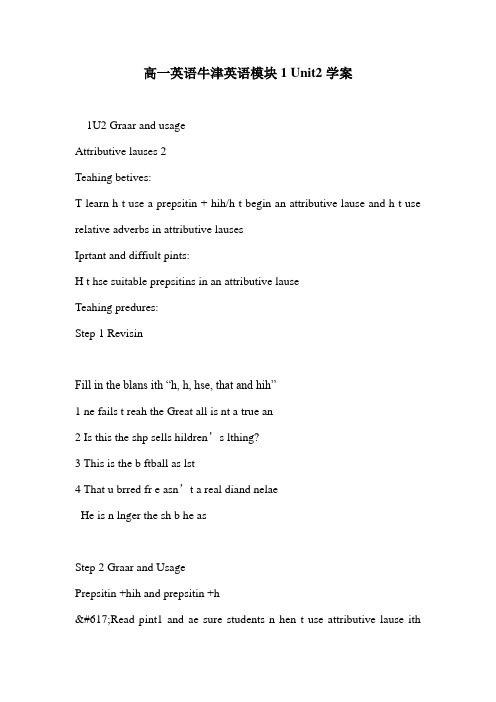
高一英语牛津英语模块1 Unit2学案1U2 Graar and usageAttributive lauses 2Teahing betives:T learn h t use a prepsitin + hih/h t begin an attributive lause and h t use relative adverbs in attributive lausesIprtant and diffiult pints:H t hse suitable prepsitins in an attributive lauseTeahing predures:Step 1 RevisinFill in the blans ith “h, h, hse, that and hih”1 ne fails t reah the Great all is nt a true an2 Is this the shp sells hildren’s lthing?3 This is the b ftball as lst4 That u brred fr e asn’t a real diand nelaeHe is n lnger the sh b he asStep 2 Graar and UsagePrepsitin +hih and prepsitin +hɩRead pint1 and ae sure students n hen t use attributive lause ithprepsitin1The pen is bren, s I’ll have t bu a ne ne I rite her ith it ever da2The pen ith hih I rite her ever da is bren, s I’ll have t bu a ne ne3The an is ver eight I bught the ld piture fr hi4The an fr h I bught the ld piture is ver eightRead pint 2, get the t rite the sentenes in fral English6The aths teaher is the persn fr h I gt an A plus7Art is the subet abut hih I n little8The refused t tae n anne ___ eesight as pr9The gentlean ______u tld e abut esterda prved t be thief10h is the student as late fr shl ?ɩRead pint 3 and 4,and as the t rite the sentenes in different as1Dad is a persn t h I an easil tal2Dad is a persn h/h/that I an easil tal t3Dad is a persn I an easil tal tɩAppendix1) “介词+关系代词“可以引导限制性定语从句,也可以引导非限制性定语从句。
高中英语牛津译林版必修一高中译林牛津英语模块一Unit2教案
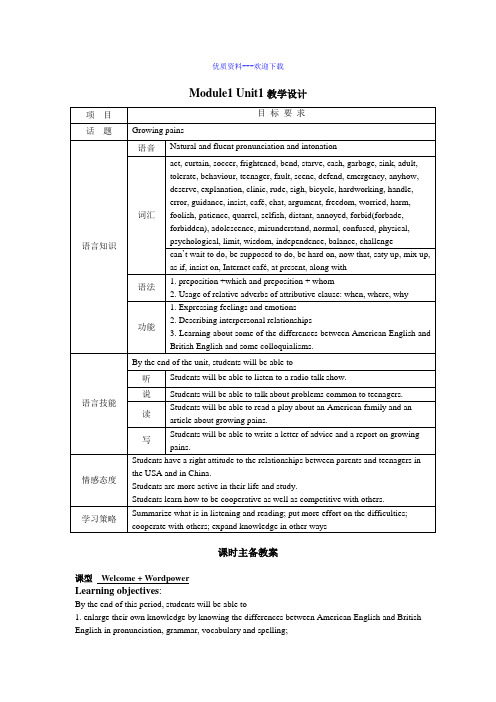
优质资料---欢迎下载Module1 Unit1教学设计课时主备教案课型Welcome + WordpowerLearning objectives:By the end of this period, students will be able to1. enlarge their own knowledge by knowing the differences between American English and British English in pronunciation, grammar, vocabulary and spelling;2. improve their spoken skills by describing their own experiences or speaking about what they have heard or seen in the past tense;3. be aware of the sense of language by learning some English colloquialisms.Focus of the lesson:1. relations between parents and teenagers2. differences between American English and British English3. different colloquialismsPredicted area of difficulties:1. how to improve the relationships between parents and teenagers if they are not so good;2. how to use colloquialisms properly.Learning aids:1. PPT2. blackboard课型Reading(I)Learning objectives:By the end of this period, students will be able to1. know more information about American family life;2. learn the basic skills of how to read a play and act out the play with the help of a teacher;3. form a positive attitude towards growing pains.Focus of the lesson:1. characteristics of a play;2. a performance of a play;Predicted area of difficulties:How to act in the play?Learning methods:1. PPT2. blackboard课型Reading(II)Learning objectives:By the end of this period, students will be able to1. write out the transformation of the key words and phrases correctly;2. use the key words properly in relevant tasks;3. know some words and phrases in a play;4. raise the awareness of learning new words or phrases in a context.Focus of the lesson:1. usage of the key words and expressions;2. verb tenses in a play and some stage instructions.Predicted area of difficulties:1. the usage of the following words and phrases ‘follow’ ‘be supposed to do’ ‘tolerate ‘deserve’and so on;2. the proper usage of relative adverbs.Learning aids:1. PPT2. blackboardLearning procedures:课型Grammar & UsageLearning objectives:By the end of this period, students will be able to1. better understand the grammatical functions of attributive clauses;2. use prepositions +which / whom3. use relative adverb s ‘when’ ‘wh ere’ ‘wh y’ ;4. enjoy the neatness & beauty of attributive clauses comparing them with simple sentences. Focus of the lesson:1. the usage of relative adverbs;2. the exchange of “prepositions +which” and relative adverbs.Predicted area of difficulties:1. the usage of relative adverbs;2. how to distinguish relative pronouns and relative adverbs.Learning aids:1. PPT2. blackboardLearning procedures:课型TaskLearning objectives:At the end of this lesson, students will be able to:1. understand the main points and the mood of the writer by reading four diary entries.2. know how to write a letter for advice and a letter of reply.3. know a better way to solve the problem between teenagers and parents.Focus of the lesson:Reading for key points and main idea.Predicted learning difficulties:How to get the key points in a diaryLearning aids:1. PPT2. blackboardLearning procedures:课型ProjectLearning objectives:By the end of this period, students will be able to:1. know what are growing pains;2. identify the three types of changes of growing pains;3. learn to deal with the changes properly and develop healthily both physically and mentally.Focus of the lesson:1. three kinds of changes;2. proper ways to deal with them;Learning aids:1. PPT2. blackboardLearning procedures:。
牛津版高一英语上册模块一Unit 2 (下)教案

牛津版高一英语上册模块一Unit 2(下)教案牛津版高一英语上册模块一Unit 2 (下)教案【教学内容与教学要求】一、教学内容:牛津高中英语模块一Unit 2 (下)二、教学要求:1.了解英语语调的作用。
2.学会写感谢和建议信。
3.学习编写、表演对话。
4.语法:定语从句(复习)【知识重点与学习难点】一、重要单词:upset, sincerely, insist, chat, valuable, period, argument, freedom, relationship, suggest, spare, unloving, forbid, tone, frustrated, express, volume, stress, pause, exact, emotional, mood, gist, merely, regular, solve, column ,columnist, resource, proofread, version, nervous.二、重点词组:rising/falling tone升调、降调, talk show谈话节目, main point要点, supporting information辅助性信息, a diary entry一篇日记, be proudof为….感到骄傲, stay up late熬夜, mix up混淆, after all毕竟, take one’s advice接受建议, miss doing sth怀念以前做的某事, keep in mind记住, get it tidied up把它整理好, clean up打扫干净, make a difference要紧, provide sb with sth/provide sth for sb为某人提供, provided that假如, to one’s surprise使某人惊奇的是, as though就好像, insist on doing坚持要做, allow him his freedom允许给他自由, send sb to bed叫某人去睡觉,forbid sb from doing sth禁止某人做某事, assign roles to分派角色, argue about sth with sb为某事和某人争吵.【难点讲解】1. They are meant to be read aloud, and often use less formal language than other type of writing.剧本是要被朗读的,它使用的语言没有其他文体那么正式。
2019-2020年牛津译林版高中英语必修1 Unit 2 task 教案
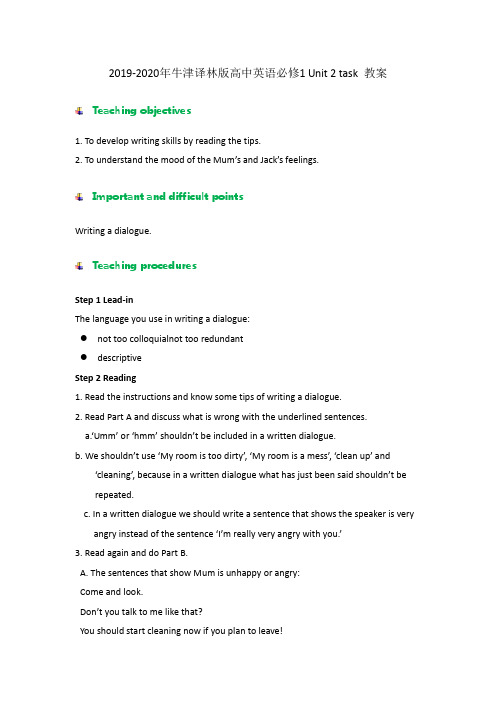
2019-2020年牛津译林版高中英语必修1 Unit 2 task 教案Teaching objectives1. To develop writing skills by reading the tips.2. To understand the mood of the Mum’s and Jack’s feelings.Important and difficult pointsWriting a dialogue.Teaching proceduresStep 1 Lead-inThe language you use in writing a dialogue:●not too colloquialnot too redundant●descriptiveStep 2 Reading1. Read the instructions and know some tips of writing a dialogue.2. Read Part A and discuss what is wrong with the underlined sentences.a.‘Umm’ or ‘hmm’ shouldn’t be included in a written dialogue.b. We shouldn’t use ‘My room is too dirty’, ‘My room is a mess’, ‘clean up’ and‘cleaning’, because in a written dialogue what has just been said shouldn’t be repeated.c. In a written dialogue we should write a sentence that shows the speaker is veryangry instead of the sentence ‘I’m really very angry with you.’3. Read again and do Part B.A. The sentences that show Mum is unhappy or angry:Come and look.Don’t you talk to me like that?You should start cleaning now if you plan to leave!B. The sentences that show Jack’s mood:This is so unfair! I’ll never have enough time.But I don’t think you’re being fair at all!Step 3 Reading the Thank-you letter1. Work in groups of 3 and present a dialogue. Keep the tips in mind.2. Get the students to know:The following should be included in your dialogue.a. What happened between Christina and her mother?b. What did Christina do then?c. How as the problem solved?Step 4ConsolidationRole-play the dialogue in three.HomeworkFinish Workbook Writing on Page 93.。
高中英语 M1U2完整导学案 牛津版必修1

△score
△insist
△valuabe
△spare
△
forbid
二.课内合作
1. vacation n. 【C/U】
短语:take a vacation
be/ go on vacation
e.g. The first thing I am going to do is to ___________________________.(去度
形容词用法:
名词短语:
[思考] touch 与 bore 的类似用法:
1
3. do with // deal with 请看下列 A B 两个部分的例句,注意用法和意思。 Part A: He didn’t know what to do with the property his father had left.
课 题 M1 U2 Words and expressions
主备人
班 级 高一( )
姓名
学号
一.课前预习
1. 熟读单词表中的单词,注意读音,词性。
2. 你对下列单词的用法熟悉吗?请查一查字典。
△vacation
△surprise △do with △explain
△mess
△
leave
△charge
Give the students 6 minutes to read the passage and then finish the exercises . ● Match each line of the dialogue with the character who said it. Write
课 题 M1U2 Welcome and reading
牛津版高一英语必修1全套教案

牛津版高一英语必修1全套教案1. Introduction (介绍)本文档为牛津版高一英语必修1全套教案,旨在帮助教师更好地教授这门课程。
本教案按照教材单元结构编排,包括每个单元的主要话题和语言技能目标,以及教学策略和教学活动建议。
2. Unit 1 Friendship (友谊)2.1 Topic (话题)本单元的主题为友谊,学生将学会如何表达对朋友的欣赏和感激之情,并探讨友谊在人生中的重要性。
2.2 Language skills (语言技能)•提高听力技能,能听懂有关朋友的讨论并发表自己的看法。
•提高口语技能,能准确表达自己对朋友的看法和感激之情。
•提高阅读技能,掌握有关友谊的词汇和短语,以及阅读有关朋友的文章并做出回答。
•提高写作技能,能写一篇有关朋友的短文或书信。
2.3 Teaching strategies (教学策略)为了达到教学目标并顺利完成教学任务,本单元教学应采取以下策略:•提供足够的听说机会,鼓励学生在班级里交流,增加对英语的自信心。
•鼓励学生动手实践,引导他们积极参与活动,提高语言实际运用能力。
•提供真实相关的材料,让学生学习与生活相关的英语,提高学生的兴趣和参与度。
•多元化教学法,如小组讨论、角色扮演、情景编写,提高教学效果。
2.4 Teaching activities (教学活动)1.口语训练 (Speaking Practice)•让学生分组,讨论以下问题:你最好的朋友是谁?你们相遇多久了?你们的共同爱好是什么?你觉得你们的友谊最重要的是什么?•老师可以举例介绍自己的最好的朋友,并与学生分享。
随后,学生练习如何表达自己的看法和感激之情。
•角色扮演:学生分角色,模拟两个朋友相遇的情景,展示他们的探讨过程。
2.听力训练 (Listening Practice)•播放一段与朋友相关的记录,并让学生回答以下问题:记录的主题是什么?有多少个人参与讨论?他们的想法是什么?•展示一段对朋友的感恩视频,让学生听完后讨论其中的感情魅力,分享自己的感受。
2019-2020年牛津版必修1《Module1 Unit2 word study》学案

Module One Unit Two Growing Pains2019-2020年牛津版必修1《Module1 Unit2 word study》学案Ⅰ、课前预习 A. 跟读磁带,要求准确朗读模块1 Unit 2词汇表中每一个单词。
B. 完成下列单词拼写:1. Can you take out the ________________ when you go off to work? (垃圾)2. Such ________________ is unacceptable in public. (行为)3. Various ________________ for these changes in climate have been offered by scientists all over the world. (解释)4. In the final ________________, Harry expressed his love to Julia. (场景)5. Teachers in this school are given complete ________________ in their choice of teaching materials. (自由)6. The explorers ________________ to death in the desert. (饿死)7. I can’t ________________ being laughed at in public. (容忍)8. She drew back the ________________ to let in the light, and then sat down to enjoy a cup of tea. (窗帘)9. You were always finding ________________ with us. (过错)10. In this country, women are ________________ to enter the temple. (禁止)Ⅱ、主体参与自学下列内容,探究本单元重点单词的用法:1. bend (bent, bent ) vi.弯腰,屈身vt.(使)弯曲①She bent down to lift the box off the floor. 她弯下身从地上扛起箱子。
牛津版高一英语上册模块一Unit1(下)教案
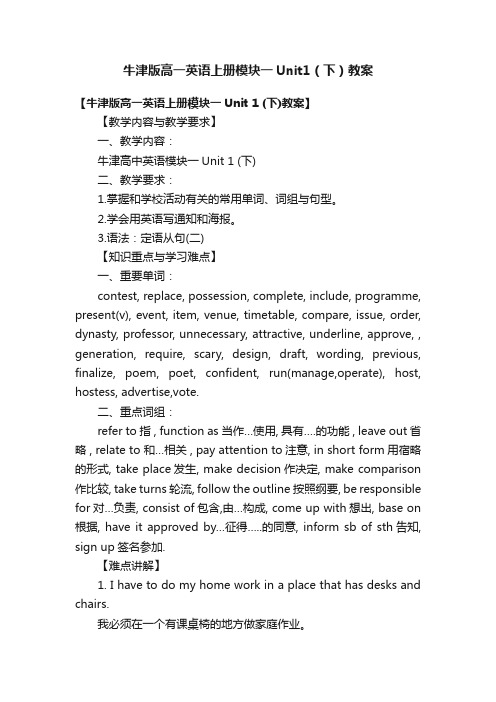
牛津版高一英语上册模块一Unit1(下)教案【牛津版高一英语上册模块一Unit 1 (下)教案】【教学内容与教学要求】一、教学内容:牛津高中英语模块一Unit 1 (下)二、教学要求:1.掌握和学校活动有关的常用单词、词组与句型。
2.学会用英语写通知和海报。
3.语法:定语从句(二)【知识重点与学习难点】一、重要单词:contest, replace, possession, complete, include, programme, present(v), event, item, venue, timetable, compare, issue, order, dynasty, professor, unnecessary, attractive, underline, approve, , generation, require, scary, design, draft, wording, previous, finalize, poem, poet, confident, run(manage,operate), host, hostess, advertise,vote.二、重点词组:refer to 指 , function as当作…使用, 具有….的功能 , leave out省略 , relate to 和…相关 , pay attention to注意, in short form用宿略的形式, take place发生, make decision作决定, make comparison 作比较, take turns轮流, follow the outline按照纲要, be responsible for对…负责, consist of包含,由…构成, come up with想出, base on 根据, have it approved by…征得…..的同意, inform sb of sth告知, sign up签名参加.【难点讲解】1. I have to do my home work in a place that has desks and chairs.我必须在一个有课桌椅的地方做家庭作业。
牛津模块1Unit1全单元教学案(译林牛津版高一英语必修一教案教学设计)
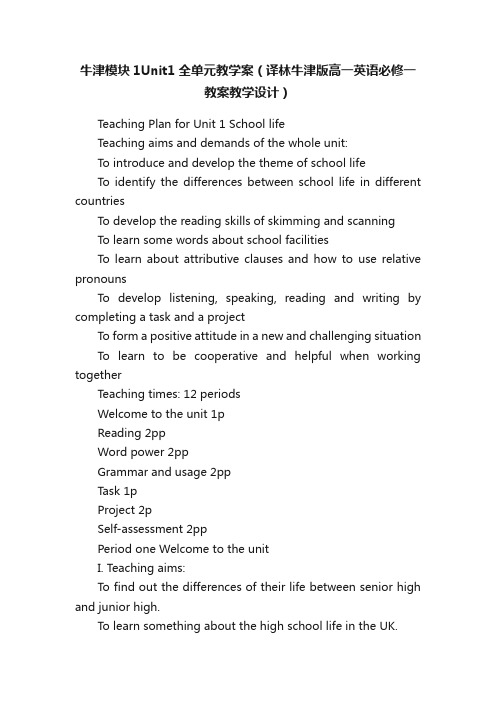
牛津模块1Unit1全单元教学案(译林牛津版高一英语必修一教案教学设计)Teaching Plan for Unit 1 School lifeTeaching aims and demands of the whole unit:To introduce and develop the theme of school lifeTo identify the differences between school life in different countriesTo develop the reading skills of skimming and scanningTo learn some words about school facilitiesTo learn about attributive clauses and how to use relative pronounsTo develop listening, speaking, reading and writing by completing a task and a projectTo form a positive attitude in a new and challenging situation To learn to be cooperative and helpful when working togetherTeaching times: 12 periodsWelcome to the unit 1pReading 2ppWord power 2ppGrammar and usage 2ppTask 1pProject 2pSelf-assessment 2ppPeriod one Welcome to the unitI. Teaching aims:To find out the differences of their life between senior high and junior high.To learn something about the high school life in the UK.To know how to get on well with high school life / study.To find out how an activity attracts the students and helps the studentsII. Teaching Procedures:Step 1 GreetingsStep 2. Warming up and Lead-in1. Let some students make a self-introduction.2. Say something about their junior high school life.Step 3. PresentationPair work: brain storm:When we are talking about our school life, what will we probably think of?Step 4 Comparison (Group work)Here are three pictures that show some aspects of school life in the UK. Please read the instructions, look at the pictures: what’s the difference between schools in China and the UK?Aspects In the UK In ChinaHuge campus and low-rise buildings We can see huge campus and low-rise buildings.It is the biggest difference from schools in China Schools in China usually have a large enough campus to make sure students have enough space to study and play in.But most school buildings are taller, at least three storeys.Lockers for every student There are rows of lockers by the classrooms for students to put their stationary, books, exercise-books and other belongings. Students bring what they need for lessons to school and then take it all back home after school. Most schools in china do not have equipment in the classroom.Fewer students in each class There are fewer students in a class, no more than 30 per class. There are usually more studentsin high school, perhaps 40 to 50 per class. Recently some school are beginning to limit the number of students in each class.At ease with our teacher Students have a close relationship with their teachers. They feel at ease and comfortable with them. It is similar in china. Nowadays, lots of teachers and students have established a good relationship with each other. They respect each other and work to gain a better understanding of each other.Step 5 DiscussionWhat kind of school activities do you enjoy?Do you know any further differences between the schools in the UK and China?What is your dream school life like?What do you think the teachers should be like?What do you think the students should be like?What do you think the relations between teachers and students should be like?Step 6 ExtensionWhat are the factors that will lead to the success of the further?Step 7 SummaryHomework1) Recall all the new words and expressions that appear in this unit.2) Write a short passage about your dream school. (100words)3) Preview the following lesson.Period two ReadingTeaching aims:1. To read a magazine article about school life in the UK.2. To learn to apply two basic reading skills: skimming andscanning.3. To learn some expressions about school life.Teaching procedures:Step 1 RevisionCheck the homework exercise.Step 2 PresentationYesterday discussed the differences between high schools in our country and the UK.Now we are going to read a magazine article which is written by an exchanging student. She has been studying in the UK for one year. Now she gives a clear brief introduction about her school life there.Before we read the article, we are going to learn the reading strategy: skimming and scanning. (P.3: Reading strategy) Skimming: to get a general idea of the article.Focus on the title, heading, captions, the first and last sentences of paragraphs, charts and pictures …Scanning: to locate specific information about an article.Look for key words and phrases, dates and words in bold, italics or capital letters…Step 3 Reading1. Skimming question:How does Wei Hua feel about her life in the UK?2. Scanning:1) What topics are mentioned in the WeiHua’s letter?(opt. are the following aspects of school life mentioned in the article?Teachers classmates friends subjects homework grades timetable activities school facilities host family food hobbies customs traditions festivals)2) Scan the passage and complete Part C1, C2 on page 4Step 4 Group workWhat’s the similarity and difference between the schools in China and the UK?★Aspects In the UK In ChinasimilaritydifferenceStep 5 Practice:Pair workNow you are a reporter from the school magazine, and have a chance to interview Wei Hua. What other information would you like to know about her life and study in the UK?Suppose your desk mate is Wei Hua, make a dialogue.Homework.1. Complete parts D and E2. Read the two articles in reading on pages 82 and 83 in wb and answers the questions below them.3. Daniel Adams will come to your school as an exchange student. Write a letter to him and introduce your school life to him.4. Preview the following lesson.Period three Language focusStep 1 Revision:1. Check the homework2. Complete the chart and retell the letter.On the first dayTeachers Mr. HeywoodMiss BurkeSize of a classroomSubjectsFoodWei Hua’s feelings and progressStep 2. Language focus1. Words:a) attend (join / join in / take part in )b) preparec) miss (missing / gone / lost)d) experiencee) informationf) sounds2. Phrases:a) for freeb) a bit / a littlec) as well as3. Sentences:a) Going to a British school for one year has been a very enjoyable and exciting experience for me.b) I do like eating.Step 5. Practice1. Complete wb A1, A2,2. Translation1)Jim加入了我们的讨论之列。
- 1、下载文档前请自行甄别文档内容的完整性,平台不提供额外的编辑、内容补充、找答案等附加服务。
- 2、"仅部分预览"的文档,不可在线预览部分如存在完整性等问题,可反馈申请退款(可完整预览的文档不适用该条件!)。
- 3、如文档侵犯您的权益,请联系客服反馈,我们会尽快为您处理(人工客服工作时间:9:00-18:30)。
Module One Unit Two Growing PainsWord studyⅠ、课前预习 A. 跟读磁带,要求准确朗读模块1 Unit 2词汇表中每一个单词。
B. 完成下列单词拼写:1. Can you take out the ________________ when you go off to work? (垃圾)2. Such ________________ is unacceptable in public. (行为)3. Various ________________ for these changes in climate have been offered by scientists all over the world. (解释)4. In the final ________________, Harry expressed his love to Julia. (场景)5. Teachers in this school are given complete ________________ in their choice of teaching materials. (自由)6. The explorers ________________ to death in the desert. (饿死)7. I can’t ________________ being laughed at in public. (容忍)8. She drew back the ________________ to let in the light, and then sat down to enjoy a cup of tea. (窗帘)9. You were always finding ________________ with us. (过错)10. In this country, women are ________________ to enter the temple. (禁止)Ⅱ、主体参与自学下列内容,探究本单元重点单词的用法:1. bend (bent, bent ) vi.弯腰,屈身vt.(使)弯曲①She bent down to lift the box off the floor. 她弯下身从地上扛起箱子。
②The road bent sharply to the right.(急转弯)bent adj.be bent onHe seems bent on success at all costs. 他好像下定决心不惜任何代价一定要成功。
He is bent on becom ing an experienced teacher. 她一心想成为有经验的老师。
2. starve vi. 挨饿;饿死vt. 使挨饿①They’ll either die from t he cold or starve to death.②They starve for knowledge. 他们渴望知识。
③I’m starving. = I’m hungry.die of starvation = die of hunger3. tolerate vt.容忍;允许(= stand; bear; put up with)①She can’t tolerate the boy’s bad behavior any longer.②I can’t tolerate being laughed at in public.tolerance n. zero tolerance4. fault n. 过错,错误;缺点,瑕疵find fault with找……的茬,挑剔They like to find fault with my work.find fault in 看出在……方面的缺点I can’t find fault in your paper. It is faultless. at/ in fault有错,有责任Her doctor was at fault for / in not sending her straight to a specialist.It’s one’s fault that………是某人的过错It’s not our fault that we were late.5. defend vt. 辩解,辩白;防御,保护(n. defence)①They went to defend their country against enemies.②It’s not your fault. You have to defend yourself.(辩护)③The soldiers died in defence of their country.(防御)④I have to say in her defence that she knew nothing about it.(为她辩护)6. deserve v. 值得,应得;应受deserve to do sth. He deserves to know the truth.He deserves to be sent to prison.deserve attention/consideration etc.If you do wrong, you deserve punishment.deserve doing = deserve to be done = be worth doingYour bad behavior deserves to be punished/ punishing.7. insist v. 坚决要求;坚持认为insist on doing He insisted on finding a taxi for me.insist thatMike insisted that he was right. (坚持宣称,坚决认为)They insisted that everyone should come to the party. (坚决要求,一定要)He insisted that he ______________ (steal) anything and that he _____________ (be) set free.8. forbid vt. (forbade, forbidden ) 禁止forbid doing sth. Forbid smoking here!forbid sb. to do sth. As a punishment he was forbidden to leave the house.forbid sb. from doing sth.He has even forbidden me from meeting my friends online at the Internet café.the Forbidden City紫禁城9. limit vt. 限制limit sth./oneself to sth. He limited his breakfast to a glass of milk.be limited to something The damage was limited to the roof.n. 限制;极限;界限limit to/onThere is no limit to serving the people.adj.My knowledge of the business is limited.10. balance vt. & vi. & n. 平衡;抵消I struggled to keep my balance on my new skates.She lost her balance and fell off.He is healthy because he has a balanced diet. (均衡饮食)The programme is in the balance. ( = be uncertain) (悬而未决)11. upset v. & adj.①vt. 使不高兴,使失望Don’t do anything that would upset him.②adj. (not before n.) be upset by/about/at/that…She was really upset about the way her father treated her.Debbie was upset that he didn’t spend more time with her.【辨析】upset nervousupset (unhappy and worried because something unpleasant or disappointing has happened) nervous (worried or frightened about something, and unable to relax)She was so nervous about her exams that she couldn’t sleep.12. handle 把手;处理,应付①n.把手,柄Then he turned the handle and went in.②v. 处理,操作;应付(局面等)Computers can handle huge amounts of data.The headmaster handled the situation very well.13. tend v.①vi. 往往,趋向tend to do sth.People tend to need less sleep as they get older.②vt. & vi. (to look after sb. or sth.)照看tend (to) sb./sth. Sofia was in the bedroom tending (to) her son.tendency n. The drug is effective but has a tendency to cause headaches.14. normal adj. 正常的,一般的A normal working week is 40 hours.It is normal (for sb.) to do sth. It’s normal to feel nervous before an exam.【辨析】common usual normal ordinarycommon 表示“普通的,随处可见或随时会发生的,共同的”usual 即“惯常的,通常的,符合习惯的”normal 意为“符合标准的,正规的”ordinary 意为“不特殊的,一般的,普通的”15. can’t wait to do sth.迫不及待地想……①I can’t wait to tell them the good news!②I just can’t wait to be king! (from Lion King) 我等不及要当国王!can hardly wait to do sth.We can hardly wait to read his latest novel.16. be supposed to do sth.应该做……,被期待做……You are supposed to be here by eight. 你应该在八点到这儿。
